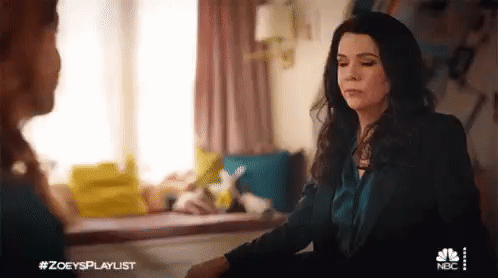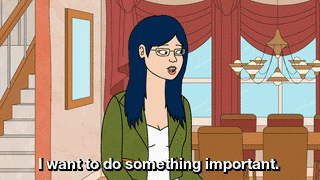This week, I fell down a Bo Burnham rabbit hole. I watched his new Netflix special Inside twice, and also dipped into the other two specials of his on there: what. and Make Happy. While I know Bo isn’t for everyone, I love him. In his work, he presents a unique balance of self-deprecation and vulnerability that I’ve not seen elsewhere.
In Inside, Bo talks about his own experiences of having panic attacks on-stage and how it ultimately caused him to stop performing at all for five years. How someone so talented and seemingly confident can be taken down by what is essentially an internal struggle really demonstrates the hold anxiety can have over us.
While Bo’s specials are typically a combination of original music, stand up comedy and personal anecdotes, there are many other realistic and relatable depictions of mental health struggles on the small screen worth mentioning.
I tweeted earlier in the week asking for examples of TV shows and films in which characters experience mental health problems not just as a reaction to a stimulus (depression following a bereavement, for example) but as part of their everyday lives. And, to add to that, instances in which mental health plays a part in a character’s life, but it’s not their entire personality.
So, shout-out to the TV and film writers who create these spot-on characters that are more than just their conditions, but also act as solid and relatable examples of what it’s like to live with mental health issues.
It goes without saying that there are some minor spoilers for the shows mentioned below.
Diane Nguyen - Bojack Horseman
Available on Netflix
(Suggested by @irinalikestea)
In the latter seasons of the show, Diane acknowledges that she’s been experiencing depression for a very long time. Diane’s depression stands out to me from other small-screen depictions for a number of reasons.
Firstly, she is an incredibly successful writer and a typically high-functioning person who manages to maintain relationships and friendships despite her condition. So often, we see depressed people painted as those who wallow in bed, unable to do anything but cry. However, Diane has one of the most significant (and lesser talked about) symptoms of depression: apathy.
Furthermore, Diane starts taking anti-depressants and experiences many of the common side effects including weight gain and loss of creativity. Something we very rarely see discussed on TV - or in any media, for that matter.
I could write an entire newsletter about the character development in Bojack Horseman, but I will save you this time. For more about Diane, I recommend this video: In Defense of Diane by Ariana Alexis.
Chidi Anagonye - The Good Place
Available on Netflix
In a show that I personally think is pretty inconsistent, Chidi is a shining light.
He never mentions any specific mental health condition (that I can recall), but Chidi is very clearly an anxiety sufferer. He struggles to make decisions (one of his biggest character flaws) and he also experiences a stomach ache at the first sight of stress… (now you can see why I empathize).
One thing I will say is that I really dislike how Chidi is grouped with other characters who are, at the least, morally grey and, at worst, bad people, just because he can’t make a decision and it affects the people around him. It always griped me that they made out that it was something that was in his control and never referred to the fact that it might have been a symptom of a wider condition. Still a great character, even if the show fell short for me.
Rue Bennett - Euphoria
It’s not just about a bunch of Gen Z kids running around wearing glitter on their faces and taking drugs (although there is a lot of that). Euphoria is a fantastic depiction of how mental health problems present themselves in youth and it also explores how parents/adults deal with teenagers who are mentally ill, and whether they even take them seriously at all.
Rue (played by the queen herself, Zendaya) is the main character in this rollercoaster of a TV show. At one point, Rue becomes heavily depressed and is unable to leave her bed, resulting in kidney problems from lack of fluid intake and inability to go to the toilet. I think, for me, the most poignant thing about Rue’s depression is the catatonic state she finds herself in. I’ve said it before and I’ll say it again: depression isn’t just about feeling sad… it’s about feeling nothing at all.
This is a more extreme example than others but I think it’s vital to note as it’s a really important representation of how mental health and physical health are two sides of the same coin.
Marnie - Pure
Suggested by @wordsbyrachelb
This next one is particularly close to my heart as it’s possibly the most original and relatable portrayal of OCD that I’ve ever seen on screen. OCD is more than just obsessive cleanliness and checking you’ve locked the doors. In fact, it was this show that really got me diving deep into the concepts of obsessions and compulsions, and it really highlighted my own tendencies towards both - but in a very different way to the typical interpretation of the condition.
Marnie experiences intrusive thoughts, particularly of sexual nature, and she falls into a deep spiral of anxiety, where she believes she is a bad person because of her thought patterns that she can’t escape from. This was the first time I learned that obsessions = thoughts and compulsions = acting on those thoughts… something I’ve experienced, albeit in a different way to Marnie, for years but never even realised.
I also appreciate the dark humour in Pure, which I think is an absolute necessity when it comes to writing a show about mental health.
Why does it matter?
Traditionally, I don’t think the small screen has done justice to mental health. While books and music offer a unique sort of introspection you only get from reading/listening to the creator’s innermost thoughts, TV shows are typically made by corporations, and the original writers’ voices are drowned out by the need for mass appeal.
Too many times we’ve sat on our sofas and watched characters go from “life is great” to having a mental breakdown because of something that happens to them… but that’s not how mental health works. Sure, external factors play a huge role in our mental state, and many people don’t experience depression until they lose a job or a loved one. But it’s never as simple as everything is great until it’s not - a storytelling foundation that simply doesn’t work for mental health.
Even when we do see mental health conditions on TV, so rarely are they anywhere near realistic, as writers have a tendency to play into the more commonly talked about symptoms - this could be anything from not fully representing lesser-known aspects of mental health all the way through to complete misconceptions of an illness (Pure is a perfect example of this).
Until we start to see realistic depictions of the full spectrum of mental health on the small screen, we will continue to face misinformation and even prejudiced attitudes - both in the workplace and in life.
Asking the Twittersphere
I have a few Twitter contributions to add to the discussion. If you can think of any that I haven’t already mentioned then feel free to tweet me @ContentByTheSea. I would particularly like to see some realistic portrayals of neurodiversity on the big and small screens, as I feel like this community has been shit on enough by the likes of Sia’s Music and Netflix’s Atypical.





📺 We’re rewatching Inside No.9 and enjoying it, even more, the second time around… knowing the twists adds another dimension to the whole experience. One of the cleverest shows on TV.
🎧 Bo Burnham, of course.
🎙 From the creator of Disgraceland, the Badlands podcast tells the dark stories from Hollywood - highly recommend for fans of true crime and cinema.
That’s all from me this week! See you all over on Twitter or reply to this email for a chat.
Enjoyed this? You might like these past issues:
10 June: Practical tips for panicky people
3 June: Sciatica strikes back
26 May: Looking after yourself is hard
19 May: He just can’t decide
12 May: Getting titillated by the tangible
5 May: Taking it all in
28 April: Be a better cheerleader
21 April: The power of procrastination
14 April: How to sell without feeling icky
7 April: Am I a bad feminist for wanting to lose weight?
31 March: The rescue dogs that rescued us
24 March: Feelings are meant to be felt










